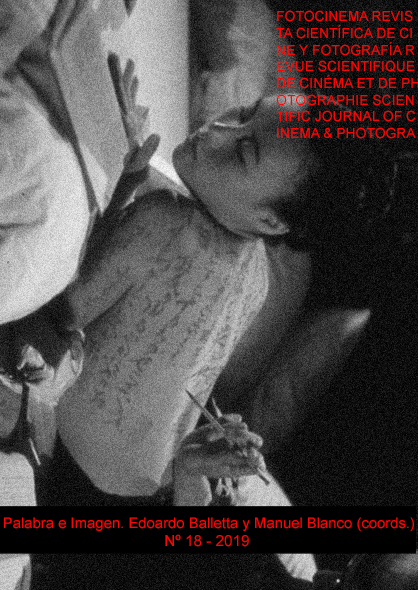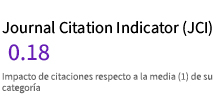The evolution of the images in the years of the last argentine military dictatorship: circulation and recepcion of hermetic-metaphorical fictions
DOI:
https://doi.org/10.24310/Fotocinema.2019.v0i18.5536Keywords:
Argentine dictatorship, Hermetic-metaphorical fictions, Circulation, Reception, Journalistic mediaAbstract
In the course of the last Argentine military dictatorship (1976-1983), the cinema and the audiovisual media in general became significant actors in the transmission and approval of the policies of the military regime. On the other hand, a no less broad sector maintained a critical and reflective position on the actions of the dictatorship. The objective of this work is to investigate the public evolution of a segment of the film production made in that period -the hermetic-metaphorical fictions that obliquely interpellated the political and social reality of the moment-, with the interest of knowing the degree of acceptance on the part of the public institutions of the time, the spectators and the journalistic media. The work is focused on four films in particular made by two dissident directors of the regime, who were successful in commercial cinemas and generated dissimilar responses in the field of public opinion and the media: The Island (Alejandro Doria, 1979), The Fears (Alejandro Doria, 1980), Time of Revenge (Adolfo Aristarain, 1981) and Last Days of the Victim (Adolfo Aristarain, 1982).
Downloads
Metrics
Publication Facts
Reviewer profiles N/A
Author statements
Indexed in
-
—
- Academic society
- N/A
- Publisher
- Universidad de Málaga
References
Avellaneda, A. (1896). Censura, autoritarismo y cultura: Argentina 1960-1983. Buenos Aires: Centro Editor de América Latina.
Brenner, F. (1993). Adolfo Aristarain. Los directores del cine argentino. Buenos Aires: Centro Editor de América Latina.
Campo, J. (2015). With the Southern Cross at their backs. Documentary Film from the Southern Cone during Exile (1970-1980). Latinoamérica: The Time and the People: Memories, Passion, Work and Life (pp. 4-10): Yamagata: Yamagata International Documentary Film Festival.
Campo, J. (2017). Revolución y Democracia – El cine documental argentino del exilio 1976/1984. Buenos Aires: Fundación CICCUS.
Cerviño, M. E. (2012). Las revistas culturales como espacios de resistencia en la última dictadura militar argentina. De El Expreso Imaginario a El Porteño. Desafíos (24), 105-134. http://www.redalyc.org/articulo.oa?id=359633172005.
Gociol, J. & Invernizzi, H. (2006), Cine y dictadura. La censura al desnudo. Buenos Aires: Capital Intelectual.
Lusnich, A. L. (2015). Resistencia política y ficción cinematográfica: Argentina 1976-1989, Significação - Revista de Cultura Audiovisual 42(43), 96-113.
DOI: https://doi.org/10.11606/issn.2316-7114.sig.2015.98294.
Lusnich A. L. (2016). Formas del disciplinamiento social en las ficciones alegóricas y metafóricas realizadas en épocas de la dictadura y la postdictadura en Argentina. IdeAs. Idées d'Amérique (7), 1-17. http://journals.openedition.org/ideas/1528; DOI: 10.4000/ideas.1528.
Pellettieri, O. (1994). Teatro argentino contemporáneo (1980-1990). Buenos Aires: Editorial Galerna.
Rodríguez, L. (2015). Cultura y dictadura en Argentina (1976-1983). Estado, funcionarios y políticas. Anuario Colombiano de Historia Social y de la Cultura 42 (2), 299-325. DOI: https://doi.org/10.15446/achsc.v42n2.53338.
Romano, S. (2007). Detrás de la pantalla: autoritarismo, censura y represión en los medios: Un estudio de caso, Córdoba 1973-1983, Prohistoria [online] (11), 61-89 pp. http://www.scielo.org.ar/scielo.php?script=sci_arttext&pid=S1851-95042007000100004.
Sorlin, P. (2013). Prefacio. En R. Muller & T. Wieder (Dir.), Cine y regímenes autoritarios del siglo XX (pp. 9-20). Buenos Aires: Nueva Visión.
Visconti, M. (2014). Lo pensable de una época. Sobre La historia oficial de Luis Puenzo. Aletheia. 4 (8) 1-13. http://www.aletheia.fahce.unlp.edu.ar/numeros/numeros/numero-8/articulos/lo-pensable-de-una-epoca.-sobre-la-historia-oficial-de-luis-puenzo
Weinritcher, A. (2005). Jugando en los archivos de lo real. Apropiación y remontaje en el cine de no ficción. En C. Torreiro & J. Cerdan (Eds), Documental y vanguardia (pp. 43-64). Madrid, España: Cátedra.
Wolf, S. (1992). El cine del Proceso. Estética de la muerte. Cine argentino: la otra historia, Buenos Aires: Letra Buena.
Xavier, I. (1999). Historical Allegories. En T. Miller & (Eds.), A companion to filme theory. Oxford, Inglaterra, Blackwell.
Downloads
Published
How to Cite
Issue
Section
License
All contents published in Fotocinema Revista científica de cine y fotografía are protected under the Creative Commons Attribution-NonCommercial-ShareAlike 4.0 International (CC BY-NC-SA 4.0) license. All about this license is available in the following link: <http://creativecommons.org/licenses/by-nc-sa/4.0>
Users can copy, use, redistribute, share and exhibit publicly as long as:
- The original source and authorship of the material are cited (Journal, Publisher and URL of the work).
- It is not used for comercial purposes.
- The existence of the license and its especifications are mentioned.
There are two sets of authors’ rights: moral and property rights. Moral rights are perpetual prerogatives, unrenounceable, not-transferable, unalienable, imprescriptible and inembargable. According to authors’ rights legislation, Fotocinema. Revista científica de cine y fotografía recognizes and respects authors moral rights, as well as the ownership of property rights, which will be transferred to University of Malaga in open access. The property rights are referred to the benefits that are gained by the use or the dissemination of works. Fotocinema. Revista científica de cine y fotografía is published in an open access form and it is exclusively licenced by any means for doing or authorising distribution, dissemination, reproduction, , adaptation, translation or arrangement of works.
Authors are responsable for obtaining the necessary permission to use copyrighted images.














13.png)



